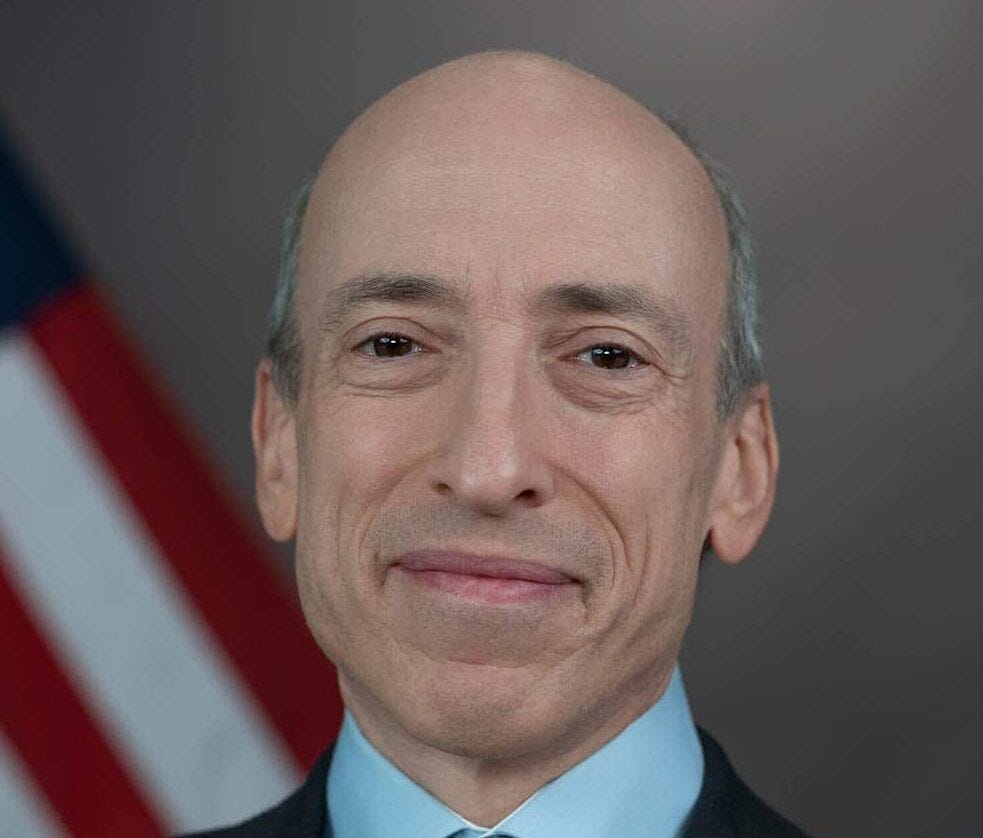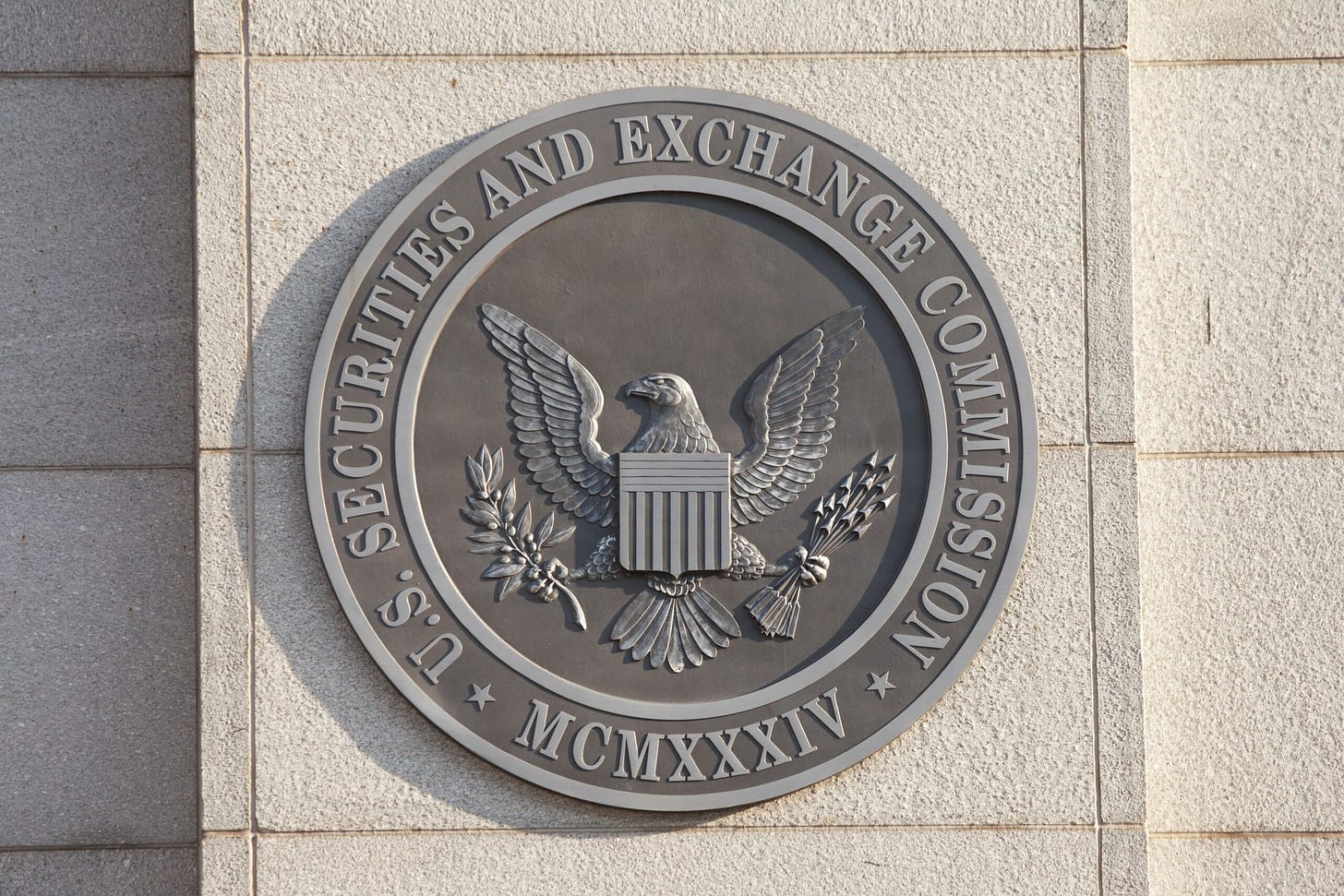Why BlackRock's $100M Fund is Turning Heads
Weekly News Recap: 🕵️ SEC probes Ethereum Foundation, 😟 Doubts cloud spot Ether ETFs, 🏛 SEC faces court sanctions, 🚨 Sam Bankman-Fried's lengthy sentence looms, 🌀 Tornado Cash trial, and more!
You are reading the Unchained Weekly newsletter, where we cover all the major news in the crypto space, providing insights into the market's latest trends, regulatory shifts, and technological advancements. Stay informed with your no-hype resource for all things crypto.
If You Like Unchained: Refer us with a friend and earn a Premium subscription!
In this episode of Unchained, Carlos Domingo, the CEO and founder of Securitize, shared insights into BlackRock's pioneering venture into the realm of tokenized investment funds with the BlackRock USD Institutional Digital Liquidity (BUIDL) Fund.
This step, realized in partnership with Securitize, marks BlackRock's bold entry onto the Ethereum blockchain, underscoring the asset management giant's commitment to integrating institutional-grade financial products with the flexibility and efficiency of crypto technology.
Domingo discussed the decision behind selecting Ethereum as the foundation for this venture, emphasizing the fund's goal to facilitate quicker token issuance, redemption, and seamless transfers for crypto institutions.
He said, "I think BlackRock is a very forward-thinking company that they see where the future is. And if the future is a public blockchain, then you can start there."
Listen to the episode on Apple Podcasts, Spotify, Fountain, Overcast, Podcast Addict, Pocket Casts, Castbox, Google Podcasts, Amazon Music, or on your favorite podcast platform. Or watch it on YouTube.
Weekly News Recap
SEC Probes Ethereum Foundation Post Proof-of-Stake Transition
This week, reports emerged that the Ethereum Foundation is under investigation by the Securities and Exchange Commission (SEC) following Ethereum's transition to a proof-of-stake model. This scrutiny could stem from concerns that Ethereum’s new model aligns more closely with the characteristics of a security. Notably, the Foundation's website removed language in February indicating it had not been contacted by government agencies in a manner requiring confidentiality, sparking speculation about regulatory inquiries.
Fortune's investigation suggests that the SEC's interest was piqued shortly after Ethereum's shift to proof-of-stake, probing how this governance model impacts its legal classification. The removal of the Ethereum Foundation's "warrant canary" and confidentiality language coincides with Fortune's report of US companies receiving subpoenas related to Ethereum, hinting at an extensive review by the regulator.
The potential classification of Ethereum as a security by the SEC carries significant implications for the cryptocurrency's ecosystem and for pending Ethereum ETF applications by major financial institutions.
SEC Likely to Reject Spot Ether ETFs, Bloomberg Analysts Predict
Bloomberg ETF analysts James Seyffart and Eric Balchunas have adjusted their outlook on the approval of spot Ether ETFs by the SEC, now predicting a likely rejection. The analysts' assessment is based on the absence of recent communications between fund issuers and the SEC, which is a critical indicator of the regulatory body's engagement and intent. The final decision deadline set by the SEC for the first ETH ETF application is May 23, 2024.
Amid the uncertainty, some industry figures suggest that delaying Ethereum ETF approval could benefit the crypto sector. Bitwise CIO Matt Hougan in a panel at the Digital Asset Summit in London said that a delay until December could allow the market more time to adapt to the recent introduction of Bitcoin ETFs.
SEC Sanctioned for Misconduct Amidst Senators' Concerns Over Crypto ETFs
Continuing with more SEC news, the Commission was sanctioned this week by a U.S. District Court for misleading the court in its lawsuit against crypto firm Debt Box, marking a significant rebuke for the regulator's handling of the case. Judge Robert J. Shelby criticized the SEC for presenting misleading evidence and engaging in a "gross abuse of power," an action that has further fueled discussions about the SEC's approach to cryptocurrency regulation.
Simultaneously, Senators Jack Reed (D-RI) and Laphonza Butler (D-CA) have expressed reservations about the SEC's recent approvals of bitcoin ETPs, highlighting concerns over inadequate risk disclosures. In a letter to SEC Chair Gary Gensler, the senators argued that the distinctions between ETPs and ETFs leave significant gaps in investor protections, urging the SEC to halt further approvals of crypto ETPs.
Prosecutors Seek Decades-Long Sentence for Sam Bankman-Fried
U.S. prosecutors have recommended a prison sentence of 40 to 50 years for Sam Bankman-Fried, the founder and former CEO of the cryptocurrency exchange FTX, highlighting the unprecedented scale of his alleged financial crimes. The recommendation was made to Judge Lewis Kaplan ahead of Bankman-Fried's sentencing hearing scheduled for March 28, 2024. The prosecution's letter to the judge outlined the multifaceted nature of Bankman-Fried's offenses, which include defrauding customers and investors, fabricating financial documents, making illegal political donations, and engaging in bribery.
The defense, seeking leniency, proposed a considerably lighter sentence of six years, citing the potential for FTX customers to be fully reimbursed through ongoing bankruptcy proceedings. However, the prosecution argues that the severity and complexity of Bankman-Fried's actions, which affected tens of thousands globally and involved over $10 billion in losses, justify a lengthy sentence. They also argued that Bankman-Fried poses a continuous risk of reoffending, emphasizing the need for a punishment that reflects the gravity of his crimes and deter similar future offenses.
Bankman-Fried's legal team has criticized the prosecution's stance, describing it as excessively harsh and likening it to a "death-in-prison" sentence. They argue that their client has been unfairly portrayed as a villain, insisting that financial recovery for affected parties is feasible and that no real losses occurred. The final decision on Bankman-Fried's sentence will be made by Judge Kaplan on Thursday next week. Stay tuned for our live coverage!
Tornado Cash Developer Faces Trial Over $1.2 Billion Money Laundering Charges
Alexey Pertsev, the developer of the cryptocurrency mixing service Tornado Cash, is slated for trial in the Netherlands on March 26, facing allegations of laundering over $1.2 billion. The Dutch prosecutors' indictment, meticulously detailing 36 suspect transactions, accuses Pertsev of facilitating money laundering through Tornado Cash, a platform designed to obscure the origins of digital assets. The largest transaction highlighted involved more than 175 ETH from the Ronin Bridge exploit linked to the infamous $625 million hack attributed to the North Korean cyber group, Lazarus.

Pertsev, arrested in August 2022 and subsequently placed under house arrest with GPS monitoring, has consistently denied any wrongdoing. His legal representation, led by Keith Cheng, challenges the indictment's lack of specificity regarding Pertsev's alleged criminal actions. The case has ignited a firestorm within the crypto community, with supporters decrying what they see as an overreach into the realm of software development and coding. Influential voices, including Coinbase and the Blockchain Association, have rallied to Pertsev's defense, arguing that the mere act of developing software should not be conflated with criminal activity.
Dutch prosecutors, while acknowledging the legality of cryptocurrency mixing services in principle, emphasize that the laundering and concealment of criminal proceeds remain punishable offenses. This trial is not only a pivotal moment for Pertsev but also a potentially precedent-setting case for the broader crypto and open-source communities.
EtherFi Investor Circumvents Vesting Schedule in $700K Token Sale
Arrington Capital, an investor in the EtherFi liquid staking protocol, has drawn attention and criticism from the crypto community for offloading nearly $700,000 worth of freshly airdropped ETHFI tokens to Binance, sidestepping the intended vesting schedule. According to blockchain analytics firm Nansen, Arrington Capital distributed 5,000 eETH, the liquid staking token of Ether.Fi, across ten wallets to claim 200,498 ETHFI tokens, which were then consolidated and sold on the exchange.
This maneuver raised eyebrows for potentially exploiting the airdrop mechanism, as distributing assets just below the threshold allowed Arrington to avoid the vesting schedule set for holdings above 25,000 tokens. Critics, including onchain sleuth ZachXBT, labeled the action a sybil attack, suggesting a deliberate attempt to secure a larger allocation by using multiple addresses.
EtherFi and Arrington Capital have both stated that the investment firm was unaware of the 25,000-token threshold for vesting at the time of the airdrop. EtherFi acknowledged being informed about the use of multiple wallets by Arrington but did not consider it a sybil attack. They admitted an oversight in not aggregating wallets belonging to the same entities for vesting purposes, attributing it to the rapid launch process.









